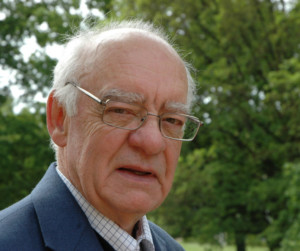
Merlin Donald is Emeritus Professor in the Department of Psychology and Faculty of Education at Queen’s University in Ontario, Canada. A cognitive neuroscientist with a background in philosophy, he is the author of numerous important papers (many of which can be found here), as well as two influential books: Origins of the Modern Mind: Three stages in the evolution of culture and cognition (Harvard, 1991), and A Mind So Rare: The evolution of human consciousness (Norton, 2001). Professor Donald’s central thesis is that humans have evolved a unique cognitive strategy not found in any other species in the biosphere: what he calls “brain-culture symbiosis”, which points to the fact that the human brain cannot realize its design potential unless it is immersed in a distributed communication network – that is, a culture – during its development. His newest research revolves around trying to understand how the slow-moving biology of the brain can deal with the rapidly changing cognitive ecology brought about by modern communications technologies.
Professor Donald has entered the debate within religious studies because his work serves as the methodological framework in Robert Bellah's Religion in Human Evolution: From the Paleolithic to the Axial Age (2011)
Cognitive neuroscientist Merlin Donald discusses the role of ritual in human evolution, and its continued importance in all forms of society and culture. In this interview, Professor Donald outlines his perspective on the evolution of human cognition, and the importance of both embodied communication and mind-sharing networks.
This work is licensed under a Creative Commons Attribution- NonCommercial- NoDerivs 3.0 Unported License.
The views expressed in podcasts, features and responses are the views of the individual contributors, and do not necessarily reflect the views of The Religious Studies Project or our sponsors. The Religious Studies Project is produced by the Religious Studies Project Association (SCIO), a Scottish Charitable Incorporated Organisation (charity number SC047750).